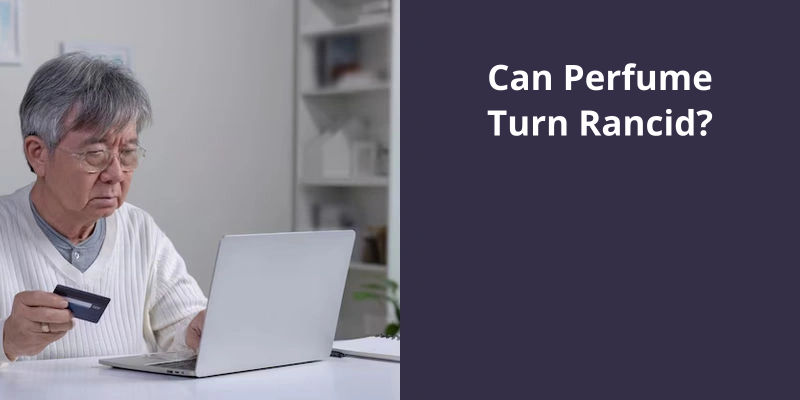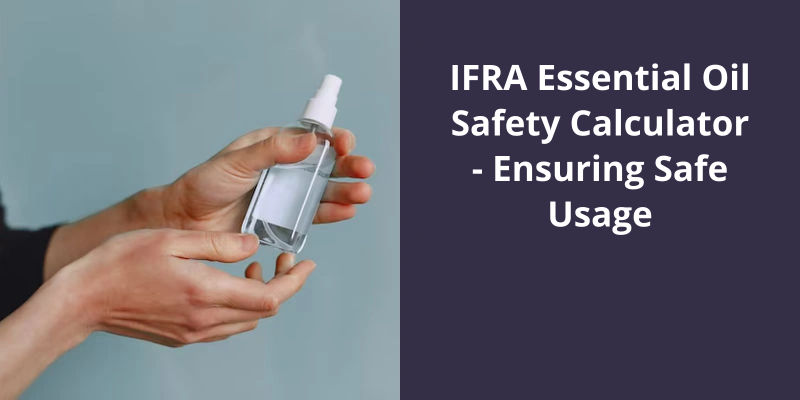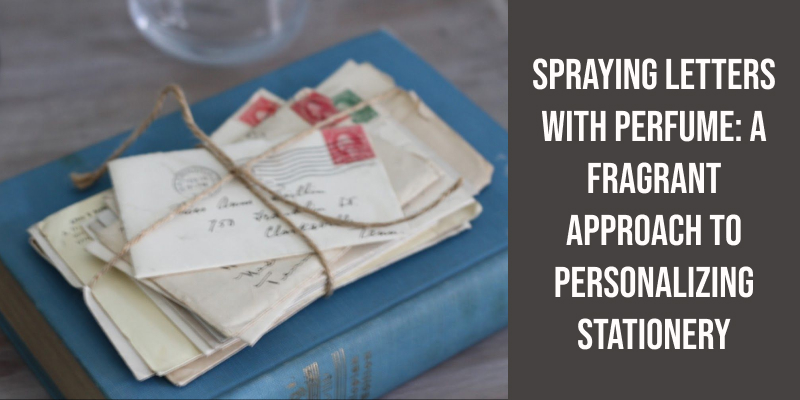Yes, perfume can turn rancid over time. Typically, the average lifespan of a perfume is between 1-3 years after it’s opened. However, this depends on its ingredients, storage conditions, and packaging. If a perfume is stored in a cool, dark spot and kept away from heat, light, and oxygen, it can last longer. Both heat and sunlight can break down the perfume’s components, making it lose its scent and potentially turning rancid. You can tell if a perfume has gone bad by a change in its color or smell.

Is Oxidized Perfume Bad?
Perfume, like any other cosmetic product, does have a shelf life. Over time, exposure to air and light can cause the essential oils and fragrances in a perfume to oxidize. When this happens, the perfume may start to turn rancid.
Is oxidized perfume bad? Keep in mind that using a perfume that’s gone off can lead to skin irritations or allergic reactions, so it isn’t something which you should take lightly. The chemical composition of the perfume may have changed, potentially making it more likely to cause adverse reactions on the skin.
Not to forget that you might smell unpleasant to the people around you because the scent will be slightly rancid. Perfumes are designed to provide a pleasant fragrance, and when they turn rancid, the result can be quite the opposite. The scent may become off-putting and overpowering, causing discomfort or even headaches for those in close proximity.
To ensure that your perfumes last as long as possible, it’s best to store them properly, away from direct sunlight and in cool, dark areas. It’s also important to pay attention to the expiration dates or recommended use-by dates indicated on the packaging. If you notice any changes in scent, texture, or consistency of your perfume, it’s better to err on the side of caution and replace it than to risk any potential negative effects.
One effective way to prevent perfume oxidation is to avoid contact with air as much as possible. By minimizing the surface area of the fragrance that’s exposed to the air, the risk of oxidation can be greatly reduced. To achieve this, it’s important to only open the cap of the perfume bottle when you intend to use it and promptly close it again afterwards, especially if you want to preserve the perfume’s quality over time.
How Do You Prevent Perfume Oxidation?
Perfume is a delicate blend of aromatic compounds, and like any other organic substance, it can undergo oxidation when exposed to air. When perfume turns rancid, it can lose it’s original scent, change in color, or even become unpleasant to wear. Therefore, it’s crucial to take preventive measures to avoid perfume oxidation and ensure it’s longevity.
By keeping the bottle tightly sealed when not in use, you limit the amount of oxygen that can interact with the fragrance. Opening the cap only when you intend to perfume yourself and promptly closing it afterward is a simple but effective practice to safeguard the perfumes quality over time.
Furthermore, storing the perfume in a cool and dark place can also help inhibit oxidation. Exposure to heat and light can accelerate the oxidation process, causing the perfume to deteriorate faster. Therefore, it’s advisable to keep your perfume away from direct sunlight and extreme temperatures, such as hot bathrooms or windowsills.
Another method to prevent perfume oxidation is to transfer the fragrance to smaller bottles. This reduces the surface area of the perfume exposed to air, minimizing the chances of oxidation. Opt for dark or opaque containers to ensure light doesn’t penetrate through and affect the fragrance.
Avoid touching the inside of the bottle or the atomizer with your fingers, as it can introduce impurities and accelerate oxidation. Also, ensure that any tools, such as droppers or funnels, used for decanting or transferring perfume are clean and sterile.
Continuous usage ensures the perfume is circulated and replenished, reducing the chances of it remaining stagnant for extended periods. However, if you’ve a vast perfume collection and don’t use a particular scent frequently, following the previous preventive measures becomes even more crucial to maintain it’s quality.
With these simple practices in place, you can continue to enjoy the aromatic experience without the worry of rancid perfumes.
How to Properly Store Perfume to Prevent Oxidation
Properly storing perfume is essential to prevent oxidation and extend it’s lifespan. When exposed to air and light, perfume molecules can break down, causing the scent to deteriorate and turn rancid over time. To prevent this, store perfume in a cool, dark place away from sunlight and extreme temperatures. Avoid keeping it in humid areas like bathrooms, as moisture can also speed up oxidation. Additionally, make sure to tightly secure the bottle’s cap or stopper to limit air exposure. By following these guidelines, you can help preserve the freshness and quality of your perfume for a longer period.
When it comes to perfumes, a change in color can sometimes be a cause for concern. A shift to a darker or cloudy hue could indicate potential spoilage, an expired product, or improper storage conditions. Exposing perfume to artificial light, strong sun, extreme temperatures, or frosty environments can all contribute to these changes. It’s important to consider these factors and take necessary precautions to ensure your perfume maintains it’s quality and longevity.
Is It Bad if Perfume Changes Color?
Perfume, like any other cosmetic product, undergoes certain changes over time. One of the noticeable changes that can occur is a change in color. While it’s not always a sign of spoilage, a significant change in color can indicate that the perfume is beginning to turn rancid. This change in color can range from a slight darkening to a cloudy appearance.
To prevent perfume from turning rancid, it’s crucial to store it properly. Keep perfume bottles away from direct sunlight and heat sources, as exposure to these elements can accelerate spoilage. Additionally, avoid storing perfumes in overly humid environments, as moisture can also compromise their quality. It’s recommended to store perfumes in cool, dark areas and ensure that the bottles are tightly sealed to minimize exposure to air.
This change in color can signal that the perfume has potentially deteriorated and may no longer be as effective or pleasant to use.
Is Perfume Still Good if It Turns Brown?
This change in color is often a sign that the perfume has undergone oxidation, which can cause it to turn rancid. Oxidation occurs when the fragrance is exposed to air, heat, or light for extended periods of time. As a result, the chemical components of the perfume can break down, leading to an unpleasant odor and a change in color.
When a fragrance turns brown, it’s a clear indication that it’s no longer in it’s optimal condition. The scent may become sour, musty, or even putrid. This can be quite disappointing for perfume enthusiasts who’ve invested in a particular fragrance, only to find that it’s gone bad.
To prevent your perfume from turning rancid, it’s important to store it properly. Keep it away from direct sunlight and extreme temperatures, as these can accelerate the oxidation process. It’s also advisable to keep the perfume in it’s original packaging or in a cool, dark place, such as a drawer or cabinet.
If you notice that your perfume has turned brown, it’s best to dispose of it. Using rancid perfume can’t only result in an unpleasant olfactory experience, but it may also cause skin irritation or allergic reactions. It’s always better to be safe than sorry when it comes to personal care products.
This change in color is often accompanied by an unpleasant and sour odor.
Conclusion
Yes, perfume and cologne do go bad. Over time, the chemical compounds in these fragrances can degrade, leading to changes in scent and overall quality. It’s important to store fragrances properly, in cool and dark spaces, to extend their lifespan. Additionally, the presence of specific ingredients, such as oils and aldehydes, can also affect the longevity of a perfume and contribute to it’s eventual deterioration. Therefore, it’s crucial to keep an eye on the expiration dates and storage conditions of perfumes to ensure they maintain their delightful scent and prevent them from turning rancid.





